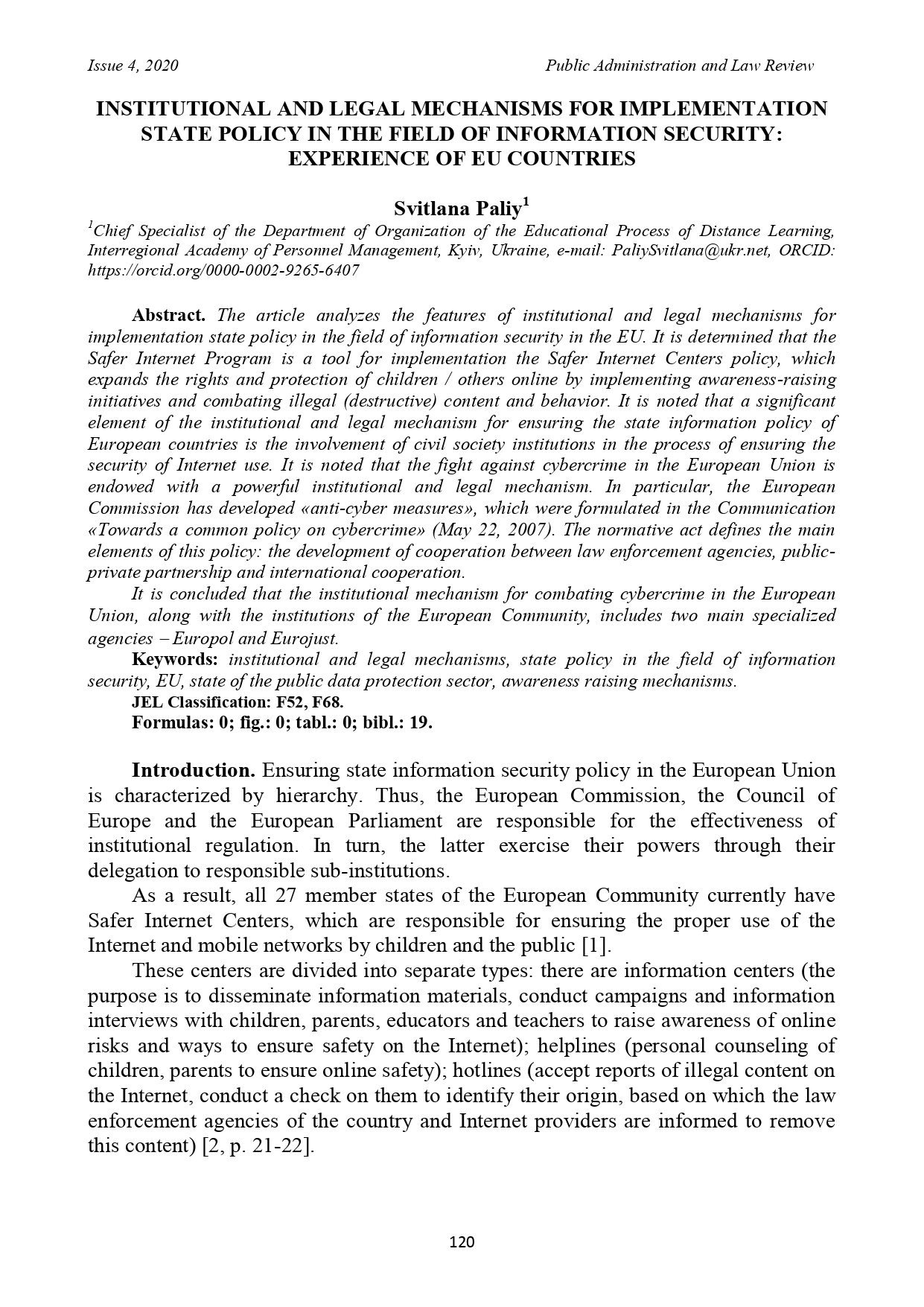INSTITUTIONAL AND LEGAL MECHANISMS FOR IMPLEMENTATION STATE POLICY IN THE FIELD OF INFORMATION SECURITY: EXPERIENCE OF EU COUNTRIES
DOI:
https://doi.org/10.36690/2674-5216-2020-4-120Keywords:
institutional and legal mechanisms, state policy in the field of information security, EU, state of the public data protection sector, awareness raising mechanismsAbstract
The article analyzes the features of institutional and legal mechanisms for implementation state policy in the field of information security in the EU. It is determined that the Safer Internet Program is a tool for implementation the Safer Internet Centers policy, which expands the rights and protection of children / others online by implementing awareness-raising initiatives and combating illegal (destructive) content and behavior. It is noted that a significant element of the institutional and legal mechanism for ensuring the state information policy of European countries is the involvement of civil society institutions in the process of ensuring the security of Internet use. It is noted that the fight against cybercrime in the European Union is endowed with a powerful institutional and legal mechanism. In particular, the European Commission has developed «anti-cyber measures», which were formulated in the Communication «Towards a common policy on cybercrime» (May 22, 2007). The normative act defines the main elements of this policy: the development of cooperation between law enforcement agencies, public-private partnership and international cooperation.
It is concluded that the institutional mechanism for combating cybercrime in the European Union, along with the institutions of the European Community, includes two main specialized agencies - Europol and Eurojust.
Downloads
References
Safer Internet Centres : European Commision, Shaping Europe’s Digital Future. Retrieved from: https://ec.europa.eu/digital-single-market/en/safer-internet-centres
European Union, Marilyn J. Raisch : American Society of International Law, 2014. – 32 p.
Insafe and INHOPE, BIK Portal. Retrieved from: https://www.betterinternetforkids.eu/policy/insafe-inhope
Protection of minors and human dignity in audiovisual and information services, 2006 : Summary of EU legislation. Retrieved from: https://eur-lex.europa.eu/legal-content/EN/TXT/?uri=LEGISSUM%3Al24030a
Safer Internet Plus, European Economic Area, EFTA. Retrieved from: https://www.efta.int/eea/eu-programmes/safer-internet-plus
Best Practice Manual for Forensic Image and Video Enhancement, ENFSI, 2018Review. 28 p. pp. 11-12
International Association of Internet Hotlines: Overall Information. Retrieved from: https://www.developmentaid.org/#!/organizations/view/69681/inhope-international-association-of-internet-hotlines
eNACSO - The European NGO Alliance for Child Safety Online : European Economic and Social Committee, 24.10.2011. Retrieved from: https://www.eesc.europa.eu/en/documents/enacso-european-ngo-alliance-child-safety-online
Safer Internet Forum : Shaping Europe's Digital Future, European Commission. Retrieved from: https://ec.europa.eu/digital-single-market/en/safer-internet-forum
Council Resolution on the protection of consumers, in particular young people, through the labelling of certain video games and computer games according to age group : 1.03.2002, Council of Europe, Official Journal of the European Communities. Retrieved from: https://eur-lex.europa.eu/LexUriServ/LexUriServ.do?uri=OJ:C:2002:065:0002:0002:EN:PDF
Protection of video game users : Eurocommission, 22.04.2008. Retrieved from: https://eur-lex.europa.eu/legal-content/EN/TXT/?uri=LEGISSUM%3Aco0002
EU Law by Josephine Steiner and Lorna Woods : Oxford University Press, 753 p.
Communication from the Commission to the European Parliament, The Council and The Committee of Regions : Commission of the European Communities, Brussels, Belgium, 22. 05. 2007. Retrieved from: https://eur-lex.europa.eu/LexUriServ/LexUriServ.do?uri=COM:2007:0267:FIN:EN:PDF
Cybercrime: new survey shows Europeans feel better informed but remain concerned : European Commission, Press Release, 29.01.2020. Retrieved from: https://ec.europa.eu/commission/presscorner/detail/en/IP_20_143
European Cybercrime Training and Education Group : ECTEG, Europe, Official Web-Site. Retrieved from : https://www.ecteg.eu
Turchak A.V. Mehanіzmi zabezpechennja іnformacіjnoї bezpeki jak skladovoї derzhavnoї bezpeki Ukraїni. Disertacіja na zdobuttja naukovogo stupenja kandidata nauk z derzhavnogo upravlіnnja za specіal'nіstju 25.00.02 – mehanіzmi derzhavnogo upravlіnnja. – Іnstitut pіdgotovki kadrіv derzhavnoї sluzhbi zajnjatostі Ukraїni. Kiїv, 2020., 229 s.
Cybersecurity: current challenges and Inria`s research directions, by S. Kremer, L. Mé, D. Rémy and V. Roca. (2019). 170 p.
Romanenko Y.O Zhukova І.V. V Ukraїnі znovu perepisali viborchij kodeks. Aktual'nі problemi rozvitku upravlіns'kih sistem: dosvіd, tendencії, perspektivi: materіali shhorіchn. nauk.-prakt. konf. 26 bereznja 2020 r. Kiїv. Harkіvs'kij regіonal'nij іnstitut derzhavnogo upravlіnnja NADU pri Prezidentovі Ukraїni, 2020. Retrieved from: http://www.kbuapa.kharkov.ua/e-book/conf/2020-1/doc/1/1-1.pdf

Downloads
Published
How to Cite
Issue
Section
License
Copyright (c) 2021 “Scientific Center of Innovative Researches” OÜ

This work is licensed under a Creative Commons Attribution 4.0 International License.





